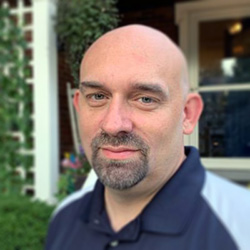What Benjamin Vaughan Learned at Northwestern Goes Beyond Research
The associate professor at the University of Cincinnati is working to build rapport with his students
Benjamin Vaughan (PhD ’07) took a lot from his time in the engineering sciences and applied mathematics (ESAM) program at Northwestern Engineering that he uses as an associate professor at the University of Cincinnati.
One lesson: establish a rapport with students. 
Vaughan said the sense of community he felt with faculty and fellow students helped him during his stint at the McCormick School of Engineering. Everybody was approachable with plenty of social interaction, and he even played softball with adviser and ESAM department chair David Chopp.
“It was a lot of social interaction, so it helped to loosen the barriers between students and faculty,” said Vaughan, a Cincinnati native. “That kind of environment appealed to me a lot, and it made things a lot easier to discuss and approach when you got stuck on something. You knew there wasn’t a barrier with titles and all the other things that can get in the way.”
Now a faculty member, Vaughan is creating the same atmosphere with his students and encourages them to call him by his first name. That’s important, he said, because he doesn’t want his students to feel blocked from discussing topics and new paths to solving problems.
That’s even more crucial because math is an objective discipline with a right and wrong answer, so the environment he’s building allows for free give-and-take to eventually get to the right place.
“That opens it up to new research and it helps bring you from being a student to being on the path for your career,” Vaughan said. “That helps a lot for job prospects. When you present at conferences, you're not as intimidated by all the other professors in the room. When you're interviewing, you feel like you're more at their level. That's really a big deal and it's one of the things that Northwestern helped a lot for me.”
Vaughan has reached his current level after spending time at both the University of Oxford and the University of Michigan as a postdoctoral researcher before getting hired at Cincinnati in 2010. One area he’s looked at is the effects of ventilators on patients and their lungs, which has become even more relevant during the COVID-19 pandemic as doctors try to determine when to use them on patients and for how long. Too much time on ventilators or going on them too early can cause damage that may even be more severe long term than the virus itself.
Now, his research concerns mathematical modeling involving dynamical systems and fluid dynamics, all of which he began studying at Northwestern that helped him get his foot in the door at other institutions.
And as for graduate students just starting out in the ESAM program, Vaughan advises them to lean on other students and the staff to get to know the surrounding area and have somebody to talk to when things get challenging.
“Get to know people,” Vaughan said. “Once you get that smoothed out, you know you’re in graduate school and they accepted you because you’re capable of doing the work. It’s just those obstacles in life that come in. Once you get that settled, it's just a matter of how far you can push yourself.”
